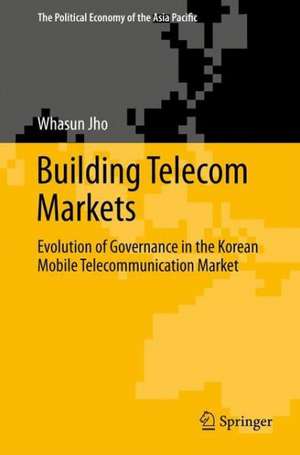Building Telecom Markets: Evolution of Governance in the Korean Mobile Telecommunication Market: The Political Economy of the Asia Pacific
Autor Whasun Jhoen Limba Engleză Hardback – 27 aug 2013
| Toate formatele și edițiile | Preț | Express |
|---|---|---|
| Paperback (1) | 637.78 lei 43-57 zile | |
| Springer – 20 dec 2013 | 637.78 lei 43-57 zile | |
| Hardback (1) | 566.75 lei 38-44 zile | |
| Springer – 27 aug 2013 | 566.75 lei 38-44 zile |
Din seria The Political Economy of the Asia Pacific
- 15%
 Preț: 649.06 lei
Preț: 649.06 lei - 18%
 Preț: 1224.36 lei
Preț: 1224.36 lei -
 Preț: 389.31 lei
Preț: 389.31 lei - 20%
 Preț: 550.14 lei
Preț: 550.14 lei - 15%
 Preț: 639.25 lei
Preț: 639.25 lei - 15%
 Preț: 639.25 lei
Preț: 639.25 lei - 18%
 Preț: 1222.94 lei
Preț: 1222.94 lei -
 Preț: 385.84 lei
Preț: 385.84 lei - 23%
 Preț: 773.65 lei
Preț: 773.65 lei -
 Preț: 382.18 lei
Preț: 382.18 lei -
 Preț: 262.09 lei
Preț: 262.09 lei - 15%
 Preț: 652.17 lei
Preț: 652.17 lei - 15%
 Preț: 646.30 lei
Preț: 646.30 lei - 24%
 Preț: 631.50 lei
Preț: 631.50 lei - 18%
 Preț: 720.53 lei
Preț: 720.53 lei -
 Preț: 197.79 lei
Preț: 197.79 lei - 15%
 Preț: 637.13 lei
Preț: 637.13 lei -
 Preț: 369.48 lei
Preț: 369.48 lei
Preț: 566.75 lei
Preț vechi: 708.44 lei
-20% Nou
Puncte Express: 850
Preț estimativ în valută:
108.45€ • 113.51$ • 90.26£
108.45€ • 113.51$ • 90.26£
Carte tipărită la comandă
Livrare economică 26 martie-01 aprilie
Preluare comenzi: 021 569.72.76
Specificații
ISBN-13: 9781461478874
ISBN-10: 1461478871
Pagini: 240
Ilustrații: XVIII, 222 p. 3 illus.
Dimensiuni: 155 x 235 x 17 mm
Greutate: 0.52 kg
Ediția:2014
Editura: Springer
Colecția Springer
Seria The Political Economy of the Asia Pacific
Locul publicării:New York, NY, United States
ISBN-10: 1461478871
Pagini: 240
Ilustrații: XVIII, 222 p. 3 illus.
Dimensiuni: 155 x 235 x 17 mm
Greutate: 0.52 kg
Ediția:2014
Editura: Springer
Colecția Springer
Seria The Political Economy of the Asia Pacific
Locul publicării:New York, NY, United States
Public țintă
ResearchCuprins
1. Research Questions.- 2. Theoretical discussion.- 3. Global Challenges in Telecommunication.- 4. Overview of the Korean Response: From Monopolies to Liberalization.- 5. The Emergence of Centralized Governance in the Korean Mobile Market.- 6. The Emergence of Flexible Governance under the WTO Regime.- 7. Conclusion.
Textul de pe ultima copertă
The mobile telecommunication industry has been one of the fastest growing industries in the global economy since the late 1990s. As the first country to offer commercial Code Division Multiple Access (CDMA) cellular service in the world, Korea was able to jump right into the digital mobile markets, enhancing its status as a leading manufacturer of mobile equipment. While the growth of the telecom industry occurred with the emergence of worldwide market-oriented regulatory reform and liberalization in telecommunications, the state-market relationship in Korea evolved from state monopoly toward “centralized governance” and later toward “flexible governance,” which is substantially different from “liberal governance” of the US. This book examines the uniqueness of Korean regulatory reforms of the mobile telecommunication sector, and argues that the market-oriented regulatory reform and liberalization should be explained by theoretic foundations of governance, focusing on the interactions among the state, the private sector and international political economic environment. It can contribute to the empirical and theoretical debates in academics and policymakers who are interested in the policymaking of states, political economy and development in the era of liberalization.
Caracteristici
Evaluates the influence of markets and technologies on telecom market liberalization and repudiate the single neo-liberal model of market-oriented reform Reconfigures the changing role of the state in a new emerging and dynamic mobile telecommunications industry Analyzes the changing relationship between the state and the private sector and empirical cases for governance perspective Includes supplementary material: sn.pub/extras










